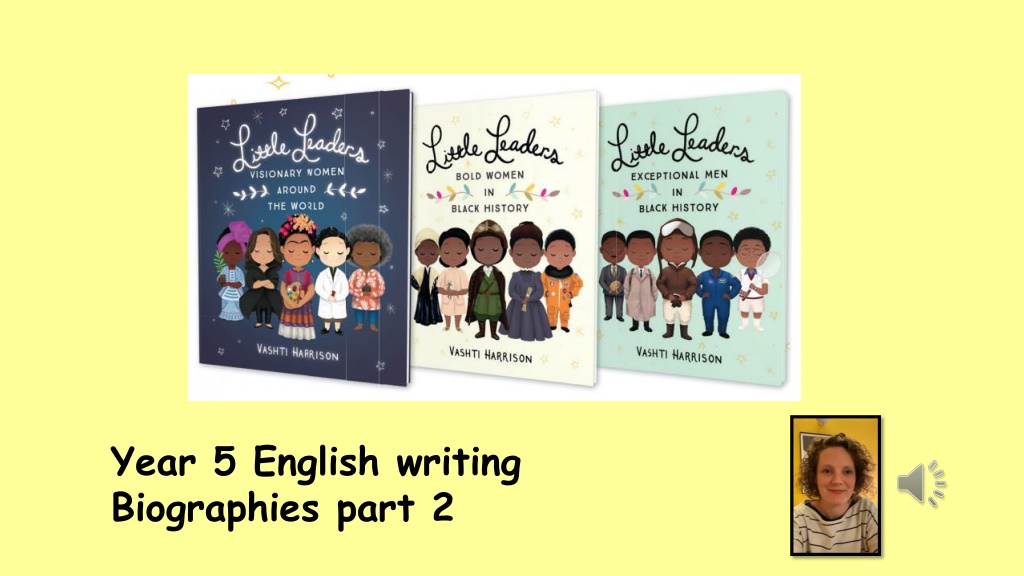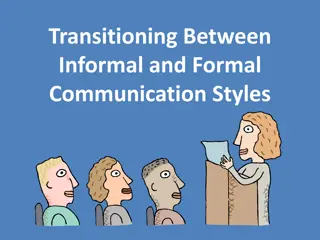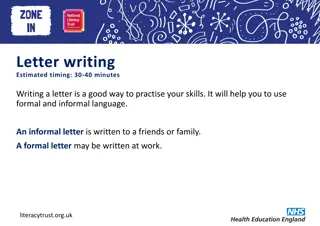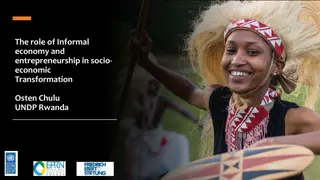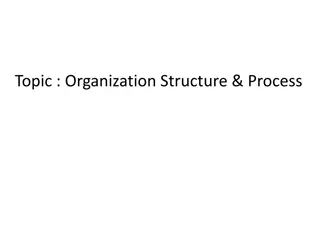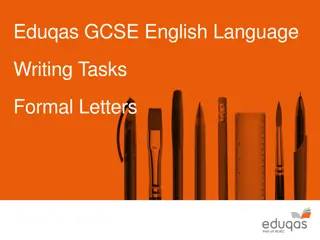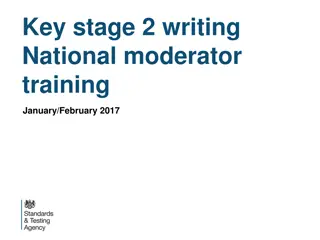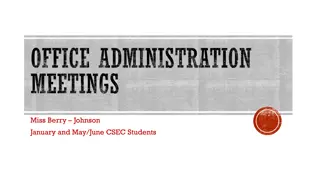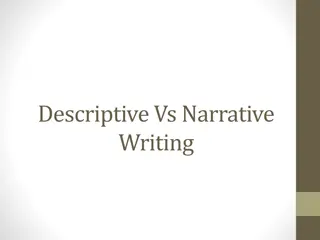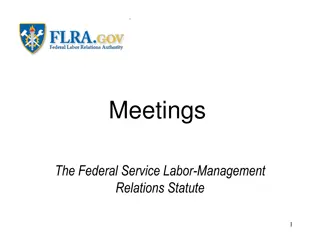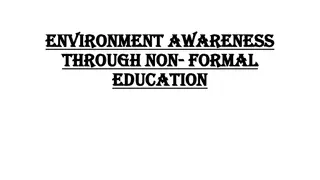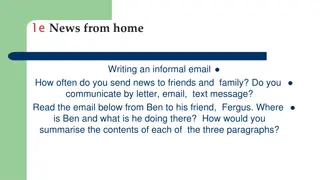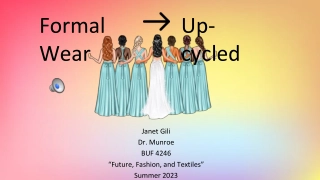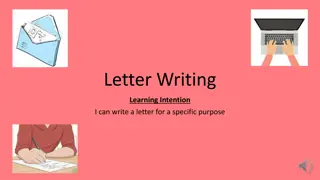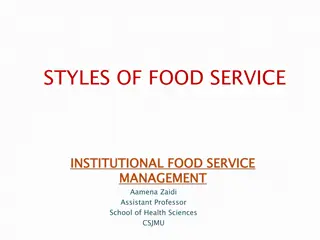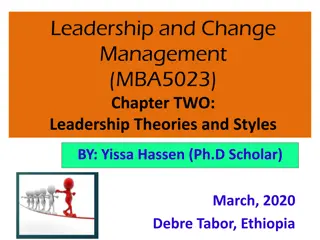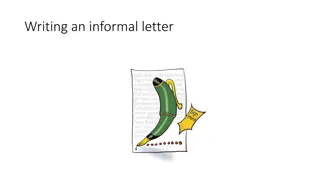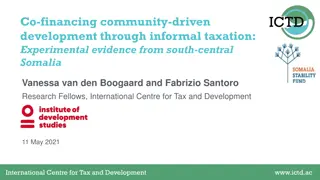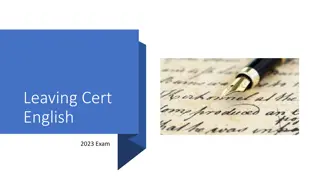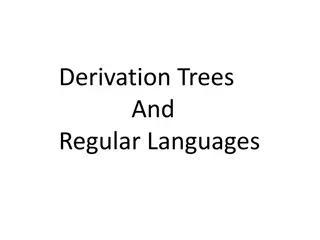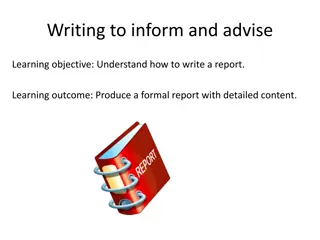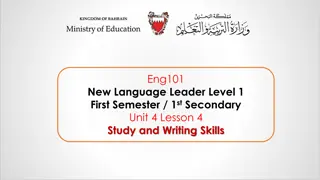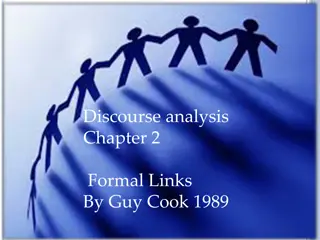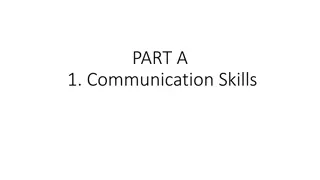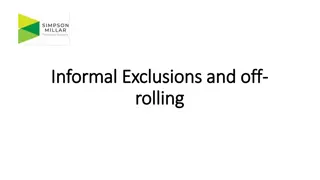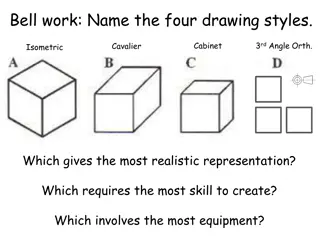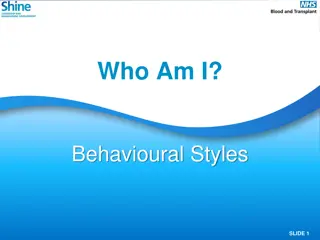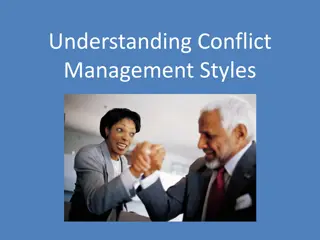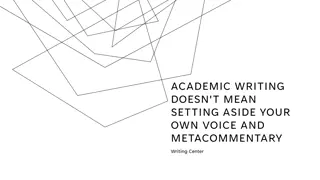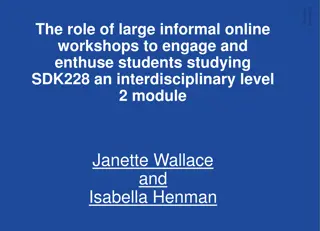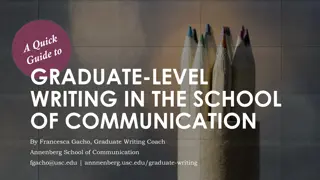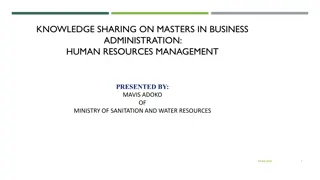Understanding Formal and Informal Writing Styles: A Guide for Year 5 Students
Explore the concepts of formal and informal writing styles through engaging activities and examples in this educational resource tailored for Year 5 English students. Learn to distinguish between the two styles, understand the criteria for each, and practice transforming sentences from informal to formal language. Enhance your writing skills with this comprehensive guide.
Download Presentation

Please find below an Image/Link to download the presentation.
The content on the website is provided AS IS for your information and personal use only. It may not be sold, licensed, or shared on other websites without obtaining consent from the author. Download presentation by click this link. If you encounter any issues during the download, it is possible that the publisher has removed the file from their server.
E N D
Presentation Transcript
Year 5 English writing Biographies part 2
Formal or informal? Biographies are written in a formal style. So let s warm up our brains with an activity to remind you of the difference. Head over to Eliot Bank s YouTube channel where you can find Miss Steadman s video explaining more about writing in formal and informal styles. http://eliotbank.lewisham.sch.uk/eliot-bank-you-tube-channel/
What is formal or informal? Sort the following criteria into formal or informal language: uses clich s (e.g. raining cats and dogs) use more contractions and abbreviations (e.g. it s or TV) has a more serious tone uses specific vocabulary for the subject uses text-style words (lol) uses the correct grammar and punctuation often uses complex sentence structures has a more chatty tone
What is formal or informal? Answers formal informal uses specific vocabulary for the subject use more contractions and abbreviations (e.g. it s or TV) uses the correct grammar and punctuation has a more chatty tone uses clich s (e.g. raining cats and dogs) has a more serious tone uses text-style words (lol) often uses complex sentence structures
What is formal or informal? 1. OMG, that film was sick! 2. Malala Yousafzai is a Pakistani activist for female education and the youngest Nobel Prize laureate. 3. The managing director requests that everyone arrives for the meeting at 9am prompt. 4. What d ya think? 5. My li l sis is soooo annoying! Arghhh!
What is formal or informal? Answers 1. OMG, that film was sick! 2. Malala Yousafzai is a Pakistani activist for female education and the youngest Nobel Prize laureate. 3. The managing director requests that everyone arrives for the meeting at 9am prompt. 4. What d ya think? 5. My li l sis is soooo annoying! Arghhh!
What is formal or informal? Change these sentences into formal language: 1. I m writing to moan about the rubbish service I got in your shop yesterday. 2. Malala did a lot of cool things. 3. I m sure your journey is gonna be brilliant! 4. She never did nothing to them.
Visionary, bold and exceptional Not everyone gets chosen to have a biography written about them! The Little Leaders series use words like visionary, bold and exceptional in their titles. What do these words mean?
Definitions Visionary: If you refer to someone as a visionary, you mean that they have strong, original ideas about how things might be different in the future, especially about how things might be improved. They have a vision of a better future. Bold: Someone who is bold is not afraid to do things which involve risk or danger. Exceptional: You use exceptional to describe someone or something that has a particular quality, usually a good quality, to an unusually high degree.
The men and women included in these books are real people with real stories. Here are some facts about them. Can you write down what each fact tells you about each person s talents, profession, identity and personality? The first one has been done as an example. Fact Talent/Profession Athlete (heptathlon) Identity and personality Sporty Hard-working Determined Tessa Sanderson (1956 - ) Frida Kahlo (1907 1954)
Complete the rest of this table. Fact Talent/Profession Identity and personality Charles R Drew (1904 1950) Harriet Tubman (1822 1913) Frederick Douglass (1818 1895)
Lets look more at the structure and features of biographies. Structure Open an attention-grabbing introduction summarising the main events of the person's life and makes the audience want to read on. Features Past tense. Closing statements using past/present tense. Info about personality and facts about achievements and their feelings. Key events are in chronological order. Early life, family, home and influences help the audience to understand the person. Quotes from the person or other key people. 3rd person. Use relevant images and captions for interest. Adverbials: accordingly, consequently etc. Concludes with what they are doing now, or how they are/will be remembered. Paragraphs. Formal language and tone.
Can you identify the features and structure in this biography of Martin Luther King? Famous around the world, Martin Luther King was a Black clergyman whose ideas helped Americans accept that black and white people were equal. In 1963, Martin Luther King planned a march to Washington to celebrate the one hundredth anniversary of the abolition of slavery. This was the site of his renowned I have a dream speech, witnessed by more than 250,000 campaigners. As he became increasingly famous, he encouraged more and more black people to strike peacefully to demand their rights. This made him so unpopular with white racists that in 1968 he was shot and killed. Born in the southern USA in 1929, Martin Luther King grew up in a time when black people were treated very badly. They were paid much less than white people and often could not eat in the same place as whites or travel in the same buses. As a young man, he went to college and trained as a clergyman. The time is always right to do what is right. Martin Luther King From the beginning of his career, Martin Luther King preached that all people were equal and promoted peaceful protests as a way of bringing about change. In Alabama at the time, black people were only allowed to sit on certain seats at the back of buses. In 1955, he encouraged them to boycott the buses, which eventually forced the bus company to change their rules. Despite his early death at the age of 39, Martin Luther King is remembered as one of America s greatest men. In fact, he is so respected in America that his birthday is a public holiday.
How did you get on? Photo with caption and quote Famous around the world, Martin Luther King was a Black clergyman King was a Black clergyman whose ideas helped Americans accept that black and white people were equal. Martin Luther Introduction, why he is important. In 1963, In 1963, Martin Luther King Martin Luther King planned planned a march to Washington to celebrate the one hundredth anniversary of the abolition of slavery. This was the site of his renowned I have a dream speech, witnessed by more than 250,000 campaigners. As he became he encouraged more and more black people to strike peacefully to demand their rights. This made him so unpopular with white racists that in 1968 he was shot and killed. Events in order Born in the southern USA in 1929, Martin Luther King grew up in a time when black people were treated very badly. They were paid much less than white people and often could not eat in the same place as whites or travel in the same buses. As a young man, he went he went to college and trained as a clergyman. Early life and influences They were The time is always right to do what is right. Martin Luther King often he became increasingly famous, Events in order From the beginning of his career, From the beginning of his career, Martin Luther King preached that all people were equal and promoted peaceful protests as a way of bringing about change. In Alabama the time, the time, black people were black people were only allowed to sit on certain seats at the back of buses. In 1955, he encouraged them to boycott the buses, which eventually forced the bus company to change their rules. Despite his early death at the age of 39, Martin Luther King is remembered as one of America s greatest men. In fact, he is so respected in America that his birthday is a public holiday. How he is remembered In Alabama at at Examples of Past tense and third person Adverbials Formal language/tone
Who inspires you? Choose somebody you think is inspirational to research and write a biography of. Things to think about: What makes them special? Did they have to overcome any challenges to be successful? What impact have they had on their community or the world? Research your chosen person. Use the headings on the next page to organise your notes. Malala Yousafzai links https://kids.britannica. com/kids/article/Malala -Yousafzai/610609 Greta Thunberg links https://www.bbc.co.uk/ne wsround/amp/47467038 If you are stuck for ideas, choose from Malala Yousafzai or Greta Thunberg. https://www.natgeokids.co m/uk/kids-club/cool- kids/general-kids- club/greta-thunberg- facts/ https://www.bbc.co.uk/ newsround/amp/468651 95
Research notes Basic facts Name: ______________________________ Important events and achievements ___________________________________ ___________________________________ ___________________________________ ___________________________________ ___________________________________ ___________________________________ ___________________________________ ___________________________________ ___________________________________ ___________________________________ Famous for: __________________________ ___________________________________ Born (date and place): __________________ Died?: _______________________ Early life (family, school, interests) ___________________________________ ___________________________________ ___________________________________ ___________________________________ ___________________________________ ___________________________________ ___________________________________ ___________________________________ What are they doing now (if alive) / how are they remembered (if dead) ___________________________________ ___________________________________ ___________________________________ ___________________________________ ___________________________________ ___________________________________
Now its time to write your biography about the person you have researched. Use these sentence starters and other vocabulary to help you. Writing time! Famous for/around the world/from a young age _________ is best known for Born in As a child/young man/woman, _______ s early life was At the age of ________, While at school/studying/training, From an early age, In [year], When he/she was ___, At the time of As he/she became By [year]/the age of ___, However, As a result, Even though , Despite After many years of , Following his/her , determined inspiration(al) inspired potential challenge achievement success setback global fame disappointment
We would love to read your biographies! Please ask an adult to email us your work on: info@eliotbank.lewisham.sch.uk
